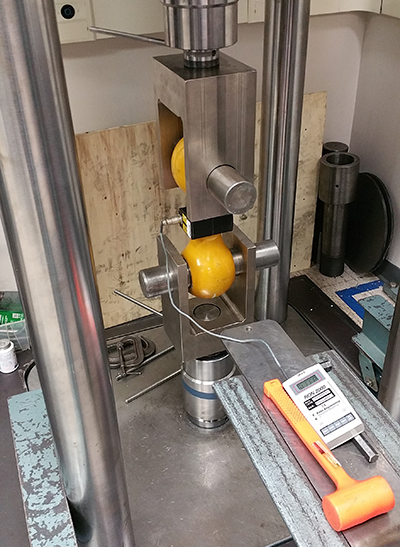Battery Life May Impact Your Calibration Results
Battery life may impact your calibration as it is becoming more and more common to have portable devices that use batteries. This can be a great benefit to someone who wants ultimate portability.
However, this portability can come with additional errors, if the portable device is not a true ratiometric device, or if the battery's voltages discharge below the allowable operating range.
In such cases, the output of a force-measuring device may change based on the batteries' conditions. Knowing these issues may exist, Morehouse decided to do some testing on a Crane Scale submitted for calibration (Figure 1) ...

| Figure 1: 250K Crane Scale being calibrated in our 5 MN UCM |
A 250,000 lbf crane scale was submitted to Morehouse laboratory for calibration along with a handheld load indicator. The meter uses three AA batteries, and for this test, we chose not to calibrate with a new set of batteries.
We decided to do the calibration exactly how it was submitted to the laboratory for calibration. We exercised the crane scale and recorded the "As Received" calibration values (Figure 2).
We did not move the device from its original position and simply replaced the batteries with new ones. The test was repeated and the second set of data is displayed in the "As Returned" column in Figure 2.

As Figure 2 indicates, we observed a 700 lbf difference at the maximum capacity point. This equated to a 0.28 % difference in load reading when the batteries were replaced with new ones. The issue was that the device submitted for calibration had a tolerance of ± 0.1 % of Full Scale or ± 250 lbf.
The Morehouse Calibration and Measurement Capability (CMC) for this test was 59 lbf (This includes contributions from the expanded uncertainty of our system of 13 lbf and the resolution of the UUT which was 100 lbf).
For the end-user, there would not be a good way to determine when the device went out of tolerance as these numbers clearly show the device to be "In Tolerance" with a new set of batteries.
Chances are the device will stay "In Tolerance", until the batteries discharge to a certain point over time. The problem is, it is very difficult to know the exact voltage level where this will happen, and the device will once again go out of tolerance.
Monitoring this effect could be very difficult for the end-user as frequent testing of the battery voltage may not be practical, nor maybe replacing the batteries after several hours of use.
This problem is clearly one the end-user will have to deal with. Luckily, not all portable devices have these issues.
There are several portable instruments that maintain accuracy specifications, display a low battery warning, or will cease to operate when the voltage is lower than the predetermined range.
In an effort to produce more confidence in our measurements, Morehouse has adopted a new policy to calibrate instruments with a new set of fully charged batteries. These batteries are shipped back with your instruments, as well as any batteries provided.
Most instruments will operate fine with a lesser charge; the word “most” is what concerns us. The Morehouse mission is to be regarded as the best independent force calibration resource in the world. In keeping with our mission, Morehouse provides a new set of batteries to ensure we can provide meaningful measurement results with the lowest uncertainties possible.

Remember, confidence in your test and measurement results starts with your calibration provider.
We will be running an additional blog post on the effects of 5 Volt versus 10 Volt excitation voltage as well as a post on AC versus DC meters before year's end.
Battery life may impact your calibration - Conclusion
If you enjoyed this article, check out our LinkedIn and YouTube channel for more helpful posts and videos.
Everything we do, we believe in changing how people think about force and torque calibration. Morehouse believes in thinking differently about force and torque calibration and equipment including how battery life may impact your calibration.
We challenge the "just calibrate it" mentality by educating our customers on what matters, and what causes significant errors, and focusing on reducing them.
Morehouse makes our products simple to use and user-friendly. And we happen to make great force equipment and provide unparalleled calibration services.
Wanna do business with a company that focuses on what matters most? Email us at info@mhforce.com.
#Battery life may impact your calibration


